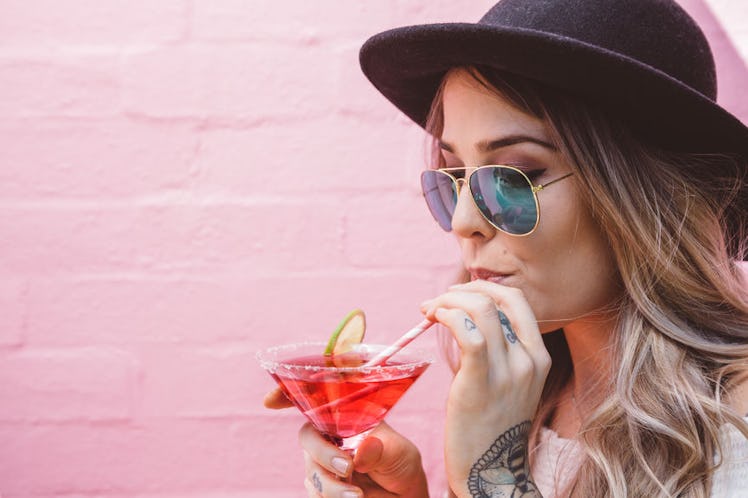
5 Signs That Partying Too Hard Is Taking A Serious Toll On Your Relationship
Choosing to party and drink isn't necessarily unhealthy or unsafe (as long as you're legally allowed to do so, of course). If you feel like you, your partner, or both of you are beginning to exhibit dangerous behavior in regards to partying, though, it might be time to look critically at your use of alcohol. In the event that excessive drinking is affecting your relationship, cutting down on habitual partying and alcohol consumption may be the solution.
It's important to recognize that there is not always a clear boundary between partying too much and struggling with addiction. Both are serious issues in their own right, but the line separating the two is easily blurred.
Whether you want to better understand the consequences of heavy drinking on your physical and mental health, or be able to identify the behaviors that accompany addiction, it's important to educate yourself. I spoke to Dr. Sal Raichbach, PsyD, LCSW, and expert in substance abuse and mental health issues at Ambrosia Treatment Center in an interview for Elite Daily for information on what to do if you think excessive partying is taking a toll on your relationship, as well as the red flags to look out for that may indicate a larger problem with alcohol.
01You spend most of your time together drinking.
"One of the biggest signs that partying is affecting your relationship is the amount of time that you or your loved one are spending partying and recovering," says Dr. Raichbach. "If it's taking time away from the two of you, it's likely that one of you, if not both, will end up resentful."
If you're the person in your relationship who likes to party, be wary of spending the majority of your time under the influence. If you're constantly drunk or hungover and neglecting your partner as a result, that's a pretty clear sign you should consider cutting back.
02One of you isn't necessarily honest about how much you're drinking.
Hiding major aspects of your life from one another is an unhealthy practice in any romantic relationship. "Successful relationships are founded on trust and honesty. If they are hiding their partying from you, it's likely there is an underlying problem," says Dr. Raichbach.
If one of you is secretive about drinking, that's a red flag. Not only does it raise alarm bells for potential issues with alcohol, but it may also take a toll on your relationship in other areas as well.
03One or both of you is prioritizing drinking over your relationship.
It's one thing if you and your partner are both into trying new craft beers or taking a shot or two every once in awhile; it's something else entirely if your relationship revolves around drinking. Pay attention to what you consider your priorities. Are you putting your partner first, or does partying take precedence? What about your partner's priorities?
"There is no clear boundary where partying becomes substance abuse," says Dr. Raichbach. "However, there are red flags to watch out for that indicate someone might have a problem.
"Usually, the first sign that partying is becoming a problem is when someone shifts their priorities to allow for more drinking. Their grades, work, and friendships will become less important and eventually fall by the wayside," says Dr. Raichbach. If you feel like either one of you is coming in second to alcohol, it may be time to get help.
04You can't seem to stop drinking, no matter how hard you try.
For most people, drinking has mild repercussions — like a hangover or spending too much money at the bar. "These things come with the territory of a night out, and a typical social drinker will re-evaluate their behavior and change their consumption as consequences get more severe," says Dr. Raichbach.
"People that struggle with substance abuse don't have that off switch. If you or someone you love continues to drink even though they don't want to, it's likely they are struggling with substance abuse," he says. If you've been trying seriously to quit drinking and you are unable to, this could be a sign of addiction.
05You're worried about how much your partner drinks.
Similarly, if you suspect that your partner is struggling with their relationship to alcohol, the first step is to educate yourself about addiction and mental health disorders. Learn the signs and understand what addiction looks like, because the more specifics you know about their situation, the more helpful you can be. Then, you can invite your partner to open up to you. "Even a simple question like, 'Hey, is everything OK? You seem off,' can open up the dialogue and let them know that you care about them," says Dr. Raichbach. However, prying any further might cause them to become defensive.
"Loving someone who has a substance abuse issue comes with plenty of difficulties, but people do recover and go on to live happy, fulfilling lives. There are plenty of resources online which help people learn how to support their loved one battling addiction instead of enabling them," says Dr. Raichbach.
Ambrosia Treatment Center developed hopetracker.org, a free online course and support community for those who love someone that struggles with addiction. For more online support and resources, visit samhsa.gov.
Check out the “Best of Elite Daily” stream in the Bustle App for more stories just like this!
Check out the entire Gen Why series and other videos on Facebook and the Bustle app across Apple TV, Roku, and Amazon Fire TV.
If you or someone you know is struggling with addiction, dial the Substance Abuse and Mental Health Services Administration toll-free, 24/7 hotline: 1-800-662-HELP (4357).